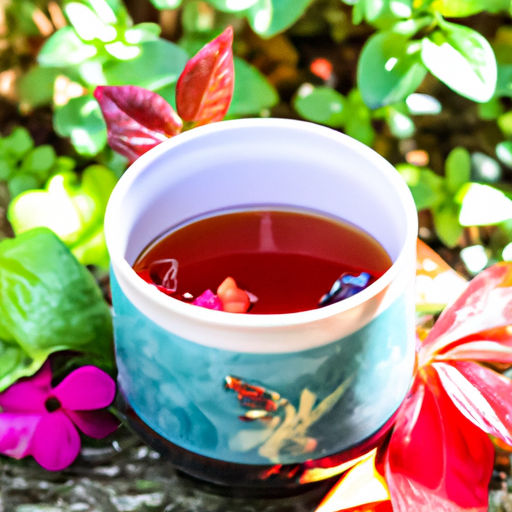Picture yourself lounging in a comfortable chair, snuggled up in a soft blanket, enjoying a hot cup of herbal tea. The scent wafts through the room, soothing your mind and taking you to a peaceful state.
But have you ever wondered how healthy this delightful beverage really is? As a tea enthusiast myself, I have delved into the world of herbal teas to uncover their potential health benefits and nutritional content.
In this article, we will explore the different types of herbal tea, examine the research behind their health benefits, and discuss any possible side effects and precautions. Whether you enjoy a soothing cup of chamomile before bed or a refreshing blend of peppermint and lemon balm to start your day, join me as we discover the truth behind the wellness claims of herbal tea.
So, grab your favorite mug and let’s embark on a journey to uncover just how healthy herbal tea truly is.
Key Takeaways
- Herbal tea offers a range of health benefits and can boost overall well-being.
- Different herbal teas have specific benefits, such as chamomile for sleep disorders and anxiety, peppermint for digestion and headache relief, ginger for anti-inflammatory effects and nausea reduction, and green tea for antioxidants and immune support.
- Herbal teas can aid in weight loss by boosting metabolism and reducing appetite when combined with a balanced diet and exercise.
- It is important to consult with a healthcare professional and be mindful of possible side effects or interactions with medications when incorporating herbal tea into your routine.
Different Types of Herbal Tea
Herbal tea offers a wide range of health benefits, making it a great choice for those looking to boost their well-being. Popular herbal tea blends include chamomile, peppermint, and ginger tea. Each of these blends has its own unique flavor and potential health benefits.
Chamomile tea is known for its calming properties and can help with sleep disorders and anxiety. Peppermint tea is refreshing and can aid digestion, relieve headaches, and soothe menstrual cramps. Ginger tea is a popular choice for its anti-inflammatory effects and can help with nausea and digestion.
In addition to these popular blends, there are also herbal teas that are specifically formulated to address specific health concerns. For example, green tea is rich in antioxidants and can help boost the immune system and support heart health. Echinacea tea is often used to prevent and treat the common cold and flu. Rooibos tea is caffeine-free and can help with allergies and skin conditions.
Overall, herbal tea provides a natural and delicious way to support your health. In the next section, we’ll explore the potential health benefits of herbal tea.
Potential Health Benefits of Herbal Tea
When it comes to potential health benefits, herbal tea has a lot to offer. First and foremost, herbal teas are known for their antioxidant properties, which can help protect the body against free radicals.
Additionally, many herbal teas can act as a natural digestive aid, helping to soothe an upset stomach and promote healthy digestion.
Lastly, herbal teas are often used as a stress relief tool, as they can have calming and relaxing effects on the body.
Antioxidant properties
Are there any other beverages that can match the antioxidant properties of herbal tea? When it comes to antioxidant benefits, herbal tea is a strong contender. It contains a variety of plant compounds, such as flavonoids and polyphenols, which have been shown to have antioxidant effects in the body. In fact, some studies have found that herbal tea may even have higher antioxidant activity than green tea.
So, what exactly does this mean for your health? Well, antioxidants help to protect your cells from damage caused by harmful molecules called free radicals. By neutralizing these free radicals, herbal tea may help reduce the risk of chronic diseases, such as heart disease and certain types of cancer.
Moving on to the next topic, herbal tea is also known for its potential digestive aid properties…
Digestive aid
If you’re looking to improve your digestion, there’s a reason why many people turn to this invigorating beverage. Herbal tea has been known to act as a digestive aid, helping to soothe an upset stomach and relieve bloating. It contains compounds that have anti-inflammatory effects, which can reduce inflammation in the digestive system and promote better digestion. Additionally, certain herbal teas, like peppermint and ginger, have been shown to have specific benefits for digestion. Peppermint tea can help relax the muscles of the gastrointestinal tract, while ginger tea can stimulate digestion and reduce nausea. Furthermore, herbal tea can also aid in weight loss by boosting metabolism and reducing appetite. Incorporating herbal tea into your daily routine can be a simple and enjoyable way to support your digestive health. When it comes to stress relief, herbal tea can also play a role in helping you relax and unwind.
Stress relief
Ironically, a warm cup of herbal tea can be your secret weapon to finding inner peace and tranquility amidst the chaos of daily life. Many herbal teas, such as chamomile, lavender, and lemon balm, contain compounds that’ve been shown to promote relaxation and reduce stress. These teas can act as natural remedies, helping to calm the mind and ease tension in the body. When consumed as part of a relaxation routine, herbal tea can enhance the effectiveness of other stress relief techniques, such as deep breathing or meditation.
While more research’s needed to fully understand the mechanisms behind these benefits, incorporating herbal tea into your daily routine can be a simple and enjoyable way to support your overall well-being.
Moving forward to the next section on the nutritional content of herbal tea, it’s important to consider its impact on our health.
Nutritional Content of Herbal Tea
To truly understand the nutritional content of herbal tea, you’ll be surprised to discover the abundance of antioxidants and vitamins it contains. Herbal teas are derived from various plants, such as chamomile, peppermint, and hibiscus, each offering unique health benefits. One of the key advantages of herbal tea is its rich antioxidant content. Antioxidants help combat oxidative stress and reduce the risk of chronic diseases like heart disease and cancer. Additionally, herbal teas are a great source of vitamins, including vitamin C and vitamin E, which support immune function and promote healthy skin.
To provide a comprehensive overview of the nutritional content of herbal tea, let’s take a look at the table below:
| Herbal Tea | Antioxidant Content | Vitamin C (mg) | Vitamin E (mg) |
|---|---|---|---|
| Chamomile | High | 1.2 | 0.8 |
| Peppermint | Moderate | 0.5 | 0.4 |
| Hibiscus | High | 4.0 | 0.6 |
| Rooibos | Moderate | 0.2 | 0.3 |
| Green Tea | High | 1.5 | 1.0 |
As you can see, herbal teas vary in their antioxidant content and vitamin levels. These factors contribute to the overall health benefits of herbal tea, including its potential role in weight loss. Research suggests that certain herbal teas, such as green tea and hibiscus tea, may boost metabolism and aid in weight management.
Now, let’s delve into the subsequent section about the research on herbal tea’s health benefits.
Research on Herbal Tea’s Health Benefits
You may not believe it, but research has uncovered some surprising health benefits associated with indulging in a cup of this magical elixir. Herbal tea has been found to have a positive impact on weight loss. It contains compounds that can boost metabolism and increase fat oxidation, helping you shed those extra pounds.
Additionally, herbal tea has been shown to boost the immune system. It’s rich in antioxidants, which help protect the body against harmful free radicals and strengthen the immune system’s defenses.
To help you enjoy these benefits, here are four things to know about herbal tea’s health benefits:
- Herbal tea can aid in weight loss by boosting metabolism and increasing fat oxidation.
- The antioxidants in herbal tea can help strengthen the immune system.
- Some herbal teas, such as green tea and chamomile, have been specifically linked to improved immune function.
- Herbal tea can be a delicious and refreshing alternative to sugary beverages, making it a healthier choice for hydration.
While herbal tea offers numerous health benefits, it’s important to note that it may have possible side effects and precautions. Transitioning into the subsequent section, it’s essential to explore these potential concerns.
Possible Side Effects and Precautions
After exploring the research on herbal tea’s health benefits, it’s essential to consider the potential risks and precautions associated with its consumption. While herbal teas are generally considered safe, it’s crucial to be aware that they can also have side effects.
Some individuals may experience allergic reactions or gastrointestinal issues such as stomach upset or diarrhea. Additionally, certain herbs used in herbal tea preparations may interact with medications or affect hormone levels.
To minimize potential risks, it’s advisable to follow dosage recommendations and consult with a healthcare professional, especially if you have any underlying health conditions or are taking medications. They can provide personalized guidance and help determine if herbal tea is suitable for you.
It’s worth noting that the majority of people can enjoy herbal teas without experiencing any adverse effects. However, it’s essential to be mindful of your body’s response and make informed choices.
With an understanding of the potential risks and precautions, we can now move on to the next section, which explores how to incorporate herbal tea into a healthy lifestyle.
Incorporating Herbal Tea into a Healthy Lifestyle
Now let’s dive into how you can effortlessly incorporate the goodness of herbal tea into your daily routine. Herbal tea has long been recognized for its potential health benefits and can be a natural remedy for various ailments.
Here are three ways you can make herbal tea a part of your healthy lifestyle:
-
Start your day with a cup of herbal tea: Instead of reaching for a caffeinated beverage, opt for a soothing cup of herbal tea. Not only will it provide hydration, but certain herbal teas like chamomile or peppermint can also help calm your nerves and promote relaxation.
-
Use herbal tea as a weight loss aid: Some herbal teas, such as green tea or oolong tea, have been associated with weight loss. These teas may help boost metabolism and increase fat burning. However, it’s important to note that herbal tea alone isn’t a magic solution for weight loss. It should be combined with a balanced diet and regular exercise for optimal results.
-
Incorporate herbal tea into your nighttime routine: Herbal teas like lavender or valerian root can aid in better sleep. Enjoying a cup of herbal tea before bed can help you unwind and promote a restful night’s sleep.
Incorporating herbal tea into your daily routine can provide numerous health benefits, from relaxation to potential weight loss support. By making herbal tea a regular part of your lifestyle, you can enjoy its natural goodness and enhance your overall well-being.
Conclusion and Final Thoughts
Incorporating herbal teas into your daily routine is like adding a burst of flavor and warmth to your life, just like a cozy sweater on a chilly day. Throughout this article, we’ve explored the health benefits of herbal tea and how it can be a part of a healthy lifestyle.
However, it’s important to evaluate the research and consider the long-term effects. When evaluating the research on herbal tea, it’s important to look for studies that are well-designed and have a large sample size. While some studies have shown promising results, it’s also important to note that the effects of herbal tea may vary depending on the individual and the specific tea being consumed.
In terms of the long-term effects, more research is needed to fully understand how herbal tea may impact our health over time. While many herbal teas are generally considered safe for consumption, some herbal teas may have side effects or interact with certain medications. It’s always a good idea to consult with a healthcare professional before incorporating herbal teas into your daily routine, especially if you have any underlying health conditions.
Incorporating herbal teas into a healthy lifestyle can be a wonderful addition. However, it’s important to evaluate the research and consider the long-term effects. By doing so, you can make informed decisions about incorporating herbal teas into your daily routine and enjoy the benefits they may bring.
Frequently Asked Questions
Can herbal tea be consumed during pregnancy?
Herbal tea can be consumed during pregnancy, but it’s important to choose the right herbs. Some herbal teas offer benefits like soothing nausea and aiding digestion, while others may be unsafe. It’s best to consult with a healthcare provider to ensure safety.
How does herbal tea affect blood pressure?
Herbal tea can have a dramatic impact on blood pressure, causing it to rise or fall significantly. While it may help lower heart rate, potential side effects should be considered before consuming.
Can herbal tea help with weight loss?
Herbal tea can potentially aid in weight loss due to its natural properties and benefits. Incorporating herbal tea into a balanced diet and exercise routine may help with weight management. Try different herbal tea recipes to find what works best for you.
Does herbal tea contain caffeine?
Yes, herbal tea can contain caffeine. While it offers benefits like increased alertness and improved focus, excessive consumption can lead to sleep disturbances. It’s important to be mindful of your caffeine intake for better sleep quality.
Can herbal tea be used as a substitute for medications?
Herbal tea can have some benefits and be used as a complementary approach to medications, but it should not be used as a direct substitute. It is important to consult with a healthcare professional for guidance on herbal tea safety.
Conclusion
In conclusion, herbal tea can be a valuable addition to a healthy lifestyle. It offers a refreshing and nutritious alternative to sugary drinks, with its diverse range of flavors and potential health benefits. Current studies suggest that herbal tea may provide antioxidant properties, aid in digestion, and boost the immune system. However, it’s important to be aware of possible side effects and precautions, such as allergies or interactions with medications. Overall, incorporating herbal tea into your routine can be a delicious way to support your well-being. Cheers to a healthier you!










